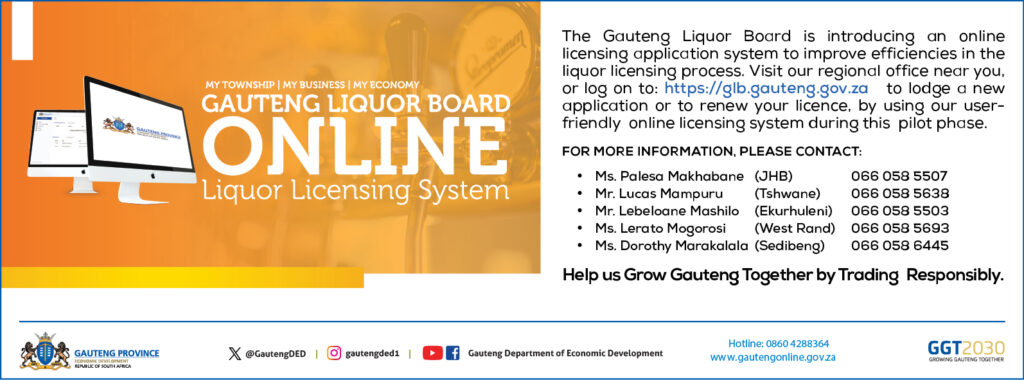BD Manufacturing PR
The ABCs Of Liquor Regulation In Gauteng
The Gauteng Liquor Act of 2003 provides a comprehensive framework for liquor trading, and our goal is to ensure that all stakeholders — business owners, legal practitioners, and policymakers — understand and adhere to these regulations. It is worth drawing attention to the key aspects of the Act, highlighting the conditions for different types of licences, trading hours, compliance requirements and the importance of following the law to avoid penalties.
Off-Consumption Licences
Off-consumption licences, such as those for liquor stores and grocer’s wine stockists, permit the sale of liquor for consumption off the premises. According to the Act, liquor may only be sold and supplied during prescribed trading hours. Licence-holders must ensure no liquor is consumed on their premises, except for approved tasting areas in liquor stores. This regulation is designed to control where and how alcohol is consumed, reducing the likelihood of public disturbances or intoxication near the store.
On-Consumption Licences
On-consumption licences apply to establishments such as restaurants, hotels, pubs, taverns and clubs. These licences allow the sale and consumption of liquor on the premises during specified hours. All liquor sold in these venues must be consumed on-site, thereby regulating public drinking and minimising alcohol-related harm in the broader community. Establishments holding these licences must comply with the trading hours and other conditions outlined in the Act.
Types of Liquor Sold
The Act differentiates between the types of liquor that various licensed premises can sell. Liquor stores are permitted to sell all kinds of liquor, whereas grocer’s wine licence-holders (typically held by supermarkets) are limited to table wine with an alcohol content of no more than 14% per volume. On-consumption licence-holders, including restaurants and pubs, may sell a variety of alcoholic beverages. This differentiation helps regulate the availability of higher-alcohol content products, particularly in venues not primarily focused on liquor sales.
Smoking Legislation
Compliance with smoking regulations is another critical aspect of the Act. We mandate that smoking areas must not exceed 25% of the total seating area, aligning with the Tobacco Controls Amendment Act. This regulation aims to protect non-smoking patrons from second-hand smoke, while accommodating smokers in a controlled manner. Liquor licence-holders must design their premises so as to adhere to these guidelines, ensuring a safe and compliant environment for all customers.
Trading Hours
The Act specifies trading hours for both off-consumption and on-consumption licences, eliminating the concept of “closed days.” Off-consumption licencees may operate from 08:00 to 20:00 from Monday to Saturday and from 09:00 to 15:30 on Sundays. On-consumption licencees, including those with night club licences, can trade from 10:00 to 02:00 daily, with night clubs starting at 18:00. Hotels have more extended hours, from 10:00 to 04:00, to cater to lodgers and guests. These regulated hours help manage the availability of alcohol and mitigate potential social issues related to late-night drinking.
Display of Licences
All licensed premises must prominently display their original licences, renewals, and approval certificates. Alternatively, a certified copy may be displayed if the original document is available on-site. This transparency ensures that both regulators and customers can easily verify the legitimacy of the business. It also helps in maintaining a standard of accountability and compliance across the industry.
Identification Requirements
Licensed premises must display specific information, including the trading name, type of licence, licence number, and trading hours, on the front door or window in characters larger than 5 cm in height. This requirement facilitates easy identification and ensures that customers and regulators are well-informed about the establishment’s licensing status.
Delivery of Liquor
The Act strictly regulates the delivery of liquor by off-consumption licence-holders. Liquor must be ordered, invoiced, and dispatched according to detailed procedural requirements. Invoices must include the name and address of the licensed business, the recipient’s details, and a description and price of the liquor. These regulations aim to prevent unauthorized sales and ensure that all transactions are traceable and compliant with the law.
Alterations to Licensed Premises
Licence-holders must seek prior approval from the Liquor Board for any structural changes to their premises. This provision ensures that modifications do not compromise safety standards or violate licensing conditions. It also allows us to keep accurate records of licensed establishments and their operational capacities.
Age Restrictions
The Act enforces strict age restrictions, prohibiting the sale of liquor to individuals under 18 and restricting employment in liquor sales to those over 21, with some exceptions for training and family members. This regulation is crucial for protecting minors from the risks associated with alcohol consumption and ensuring that those involved in liquor sales are adequately responsible and trained.
Compulsory Membership in a Liquor Traders Association
All licence-holders and applicants must be members of the Gauteng Liquor Traders Association or an affiliated body. This requirement fosters a sense of community and collective responsibility among liquor traders, encouraging adherence to industry standards and regulations.
Annual Renewal of Licences
Liquor licences must be renewed annually, within 12 months of the original issue date. This renewal process helps maintain up-to-date records of licensed premises and ensures ongoing compliance with regulatory standards.
The Gauteng Liquor Act of 2003 provides a robust framework for the regulation of liquor trading, balancing economic interests with public health and safety concerns. As the Gauteng Liquor Board, we are dedicated to ensuring that licence-holders navigate this complex set of regulations effectively. By adhering to these guidelines, liquor traders can operate responsibly, contributing to a safer and more regulated industry. For legal practitioners and policymakers, understanding the intricacies of this Act is essential for effective enforcement and continuous improvement of liquor laws in Gauteng.
Written by Cleo Bodibe-Lushaba
Director: GLB Client Relations Management






 Sign-up and receive the Business Media MAGS newsletter OR SA Mining newsletter straight to your inbox.
Sign-up and receive the Business Media MAGS newsletter OR SA Mining newsletter straight to your inbox.